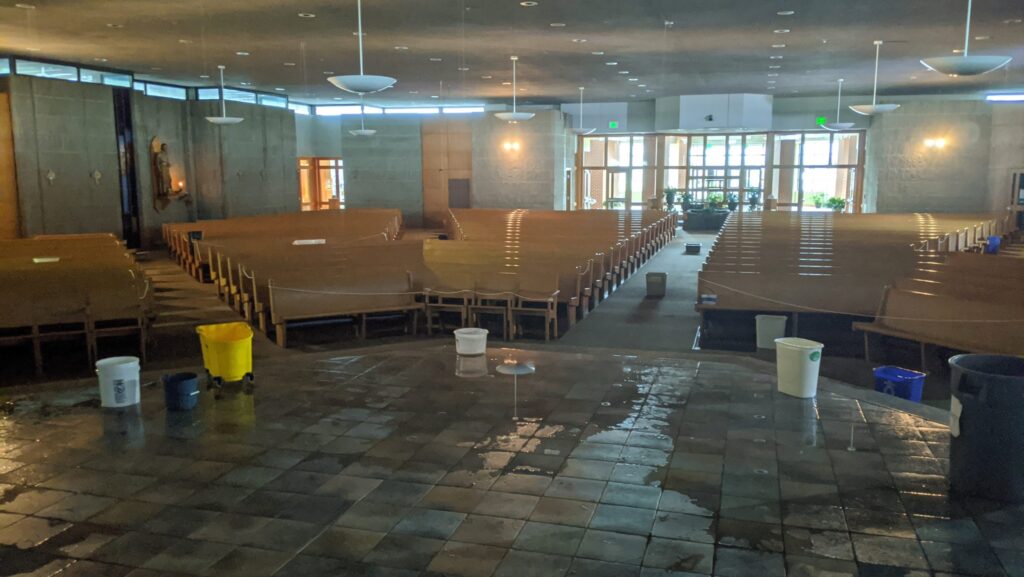
Multiple counties in Dubuque Archdiocese affected by powerful derecho

Sirens that usually warn people about approaching tornadoes went off about 15 minutes before the derecho storm struck the area of Cedar Rapids where St. Pius the X Church is located.
Michael Becker, pastoral associate at the parish, realized eventually that what he was witnessing Aug. 10 was no tornado. He was at work when heavy rain and wind gusts of more than 90 mph pounded the area for upward of 45 minutes. After getting people in other parts of the parish complex to safety, he got a glimpse of the mayhem through windows.
“It was a loud rush of sound that kept coming,” Becker said. “You’re watching trees fall down.”
The storm ripped the rubber covering on the church roof, sending a flood of water into the worship space and causing water to pour in for hours. A tree put a hole in the rectory roof and knocked out power. Still, amid the chaotic scene there was something for which to be grateful.
“The altar was untouched,” Becker told The Witness, newspaper of the Archdiocese of Dubuque. “It was dry. Everything else was drenched.”
A derecho is a widespread and usually fast-moving straight-line windstorm spanning hundreds of miles. This particular derecho was estimated at 40 miles wide and more than 700 miles long. It lasted for 14 hours as it swept from South Dakota through Iowa into Illinois and Ohio. At least four people were killed.
The storm affected nine counties in the Archdiocese of Dubuque, said Megan Stammeyer, public relations director for Catholic Charities of the archdiocese.
As part of the agency’s Disaster Relief Ministry, Stammeyer visited the affected areas. Countless homes, farms and businesses were damaged. Churches and schools also were affected including St. Wenceslaus Parish, also in Cedar Rapids, and St. Michael Parish in Norway.
The disaster ministry focuses on connecting people with a resources and social service agencies following a disaster.
“We expect this to be a long-term recovery,” Stammeyer said. “Once the trees are cleared away and the power restored, the deeper issues of poverty and inequality will continue to damage families across our state.”
With more than half the tree canopy in the Cedar Rapids region toppled, the scale of the event is unlike anything in recent history.
“We sat down as a staff (Aug. 18) and everyone had damage (at their homes),” Becker said. “I’m working on a plan to reach out to every one of our parishioners.”
Metro Catholic Outreach, a service agency supported by the Cedar Rapids area parishes, lost perishable food items used by its food bank because of a long-term power outage. Many residents also lost food while the power was out.
Executive Director Kate Getty is working with staff to support people who need food and have questions about applying for emergency grants and filing insurance claims.
“I am a born and raised Iowan. It is by far the worst disaster I’ve ever seen,” Getty said. “We’re seeing people asking, ‘What do we do next?'”
About 1 million people in the affected states lost power. Around Cedar Rapids an estimated 20,000 were still without electricity Aug. 18, Getty said.
She said hundreds of homes and apartments in her city are uninhabitable because of the storm. Getty felt blessed that the damage to her home was not as serious.
“A tree fell on our garage,” she said. “It’s a total loss. We lost all the trees in our back yard.”
Getty hopes more will be done by elected officials to respond to the disaster.
“We felt so neglected for five days,” she said.
Getty stressed that people affected need prayers, cleaning supplies, food and other basics. She believes it will take months for the Cedar Rapids area to recover.
Catholic and public schools in the region, including the Xavier Catholic School System in Cedar Rapids have postponed their start dates.
“While our Xavier Catholic Schools facilities have sustained some damage from the storm, we count our blessings that our primary issue is power and connectivity/internet access at this time,” stated a letter from school leaders to families.
Mount Mercy University suffered significant damage to its campus. McAuley Hall, a student residence, sustained significant water damage and is unusable.
“We have made the difficult decision to only place students living more than 15 miles from campus in campus housing for the fall semester,” said Nate Klein, vice president for student success, in a press release.
Other schools were more fortunate.
“There wasn’t damage to the school,” said Casey Kettmann, principal at St. Joseph School in Marion. “We just got power back (Aug. 18). We have two families displaced for at least six months.”
President Donald Trump signed a federal emergency declaration for Iowa Aug. 17 in response to a request from Iowa officials for at least $4 billion in aid to deal with property and crop damage, the Cedar Rapids Gazette reported.
An AP story said he had approved only the public assistance portion of the full request for assistance. The next day during his visit to Cedar Rapids, Trump was pressed by the mayor and other local officials to provide more disaster funds, and he said, “OK, we’ll take care of it, Mayor.”
– – –
Copyright ©2020 Catholic News Service/United States Conference of Catholic Bishops. The CNS news services may not be published, broadcast, rewritten or otherwise distributed, including but not limited to, such means as framing or any other digital copying or distribution method in whole or in part, without the prior written authority of Catholic News Service.








